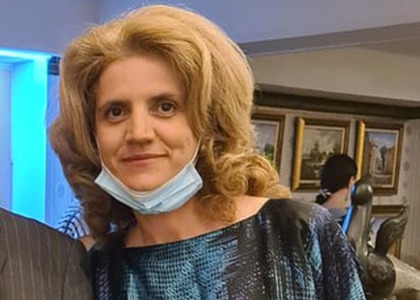> [Archived] Interviews

Interview with Maria Popa
On Wednesday, February 8th, starting at 7 P.M., a tribute event will be held at the Romanian Athenaeum dedicated to the man of culture Iancu Țucărman, which marks 100 years since his birth. We find out more details from Maria Popa, president of the "Iancu Țucărman and Maria Popa" Cultural Association, in an interview given to Ioana Țintea.
Mrs. Maria Popa, for starters, I would ask you to give us some details about the man Iancu Țucărman, considered to be a symbolic personality for the troubled European history.
We can say that Iancu Țucărman received the gift of life, traveling through history for almost a century. He lived with little benefit to himself, but with immense benefit to his fellows. He was born in Iași, in a Jewish and religious family, his father having an honorary gabbai job at one of the synagogues in Iași and, having a close relationship with his father, he was always at the synagogue. This introduces Iancu Țucărman to synagogue music, this being his first contact with music. The family had a shop, they sold musical instruments, gramophones, music records and this offered him a second contact with music by listening to these generally classical music records on the gramophone. As a young child he was educated in classical music, taking violin lessons from age 4-5 from the teacher Bernal Segal, the father of our great musician, Iosif Sava. He told in his stories that Iosif Sava was sitting under the table, in the room where his father was also helding the lessons and at one point, he told Iancu: Iancu, don't think that Iosif is sitting there for nothing, he is playing under the table" - do you know what he told me? "Father, you sing better than Iancu. Iancu said that that was Iosif Sava's first chronicle. Towards the end of his life, he dedicated his time to the discovery of young talents in the field of classical music, he supported and promoted them, along with another survivor of the Death Train from Iași, Iloaei's Bridge, Martin Sternin, a philanthropist who awarded scholarships to these young people, whom Iancu Țucărman recommended. Iancu Țucărman is a very complex personality. He passed both through the anti-Semitism and the communist periods, being a survivor of the Iași Progrom, the Iași Death Train, Iloaei's Bridge, from 1941 and then during the communist period, he held the management positions at the Ministry of Agriculture as an agronomist by profession but he didn't accept to be a party member.
Returning to the event on February 8th, on the small stage of the Romanian Athenaeum, a tribute recital will be held which will be dedicated to the 100 years celebration since the birth of Iancu Țucărman. What exactly is it about and who are the artists who will honor this event?
The cultural association that Mr. Țucărman founded organizes a recital supported by a well-known bassoonist in America, who studies in America, but also in Europe, Traian Sturza more exactly, who was also designated in the Youth of Music international competition, 2022 edition and he was honored with the Iancu Țucărman prize. We will also have Mihaela Manea, a pianist who was discovered and supported by Iancu Țucărman. Both of them live and study in Vienna. He will be joined at the beginning of the event by the actor George Custură from the Sică Alexandrescu theater.
One of the works included in the program is "Remembrances" by Ulpiu Vlad, dedicated to Iancu Țucărman, presented in the first audition. What is the story behind this opus?
Ulpiu Vlad wanted to make this dedication in the memory of Iancu's character, Remembrances telling his about the fact that we award the Iancu Țucărman prize annually, through the association with Museart Academy, which organizes this international competition, then offered to do this work in memory of Iancu Țucărman, Remembrances.
Translated by Ioana Negrea,
University of Bucharest, Faculty of Foreign Languages and Literatures, MTTLC, year II
Corrected by Silvia Petrescu














